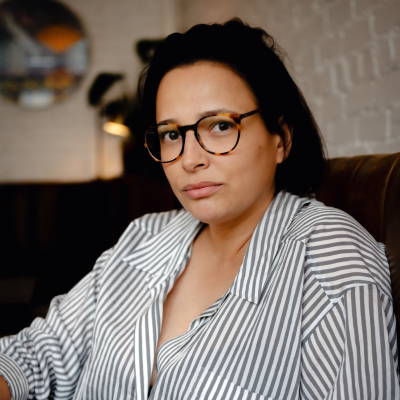FIMS News
Contact Information
FIMS Communications
Becky Blue
Email
519-661-2111x88493
FIMS & Nursing Building
Rm 2060C
Sheima Benembarek joins FIMS as the Fall 2024 Asper Fellow
 The Faculty of Information and Media Studies (FIMS) is excited to welcome author, freelance journalist, and magazine-publishing professional, Sheima Benembarek, as the Fall 2024 Asper Fellow in Media.
The Faculty of Information and Media Studies (FIMS) is excited to welcome author, freelance journalist, and magazine-publishing professional, Sheima Benembarek, as the Fall 2024 Asper Fellow in Media.
Currently a contributing writer for The Walrus, Benembarek’s writing has also appeared in Strategy, Broadview, Maisonneuve, Vogue Arabia, Chatelaine, Quill & Quire, and The Literary Review of Canada. In 2020 Benembarek was named one of the five RBC Taylor Prize Emerging Writers which helped raise her profile among literary agents and launch her career as an author. Her groundbreaking 2023 nonfiction book, Halal Sex: The Intimate Lives of Muslim Women in North America, which she began writing while she was an MFA student at the University of King’s College, stands as a major career achievement.
Originally from Morocco, Benembarek now lives in Montreal. In 2004, she moved to Canada to attend Concordia University, where she earned a bachelor's degree in literature and creative writing. Benembarek also later obtained a graduate diploma in book, magazine, and electronic publishing from Centennial College in Toronto, and a Master of Fine Arts degree in creative nonfiction and journalism from the University of King's College in Halifax.
Moving across the world and taking in a new culture is an experience she refers to as an “immigrant’s dilemma,” something she finds many immigrants go through.
“I consider myself Moroccan Canadian, straddling both places. At this point, I don’t feel completely at home in either, but I’ve been shaped by each country’s culture,” she says.
During her time as the FIMS Asper Fellow, Benembarek will teach the course Storytelling with Marginalized Communities to undergraduate students. The special topics course explores the concept of genuine and ethical relationship building while reporting on and with marginalized communities.
“When I was working on my book, Halal Sex, I found that mainstream journalism often lacked guidance on maintaining a balance between professionalism and personal connection. I want to teach students how to navigate this duality, using my experiences to illustrate how to build trust and communicate.”
Benembarek hopes students will learn to trust their intuition and recognize that when something doesn’t feel right, it’s probably not right despite what anyone else tells you. She had to unlearn the idea of the unyielding professional persona and approach stories with humanity and warmth, especially when working with personal and vulnerable narratives.
“I kept bumping against the idea of ‘Oh, it's not professional to be friendly. I must be a journalist that has clear boundaries,’ and it didn't really work because it was a very insular community and I had a lot of tough questions. What I needed to do was exactly what I had been taught not to do which was to be completely open and vulnerable and connect with my sources to allow them the feeling of comfort, safety, and the trust to open up in an authentic manner.”
At first, Halal Sex began as a fictional exploration of the sexual freedoms of immigrants and the impact it had on their family life. As Benembarek grew in experience and became more confident in her reporting and writing abilities, the project evolved into non-fiction. Over the five years it took to complete the project, she found her own way of reporting and built trusting relationships with Muslim women that allowed her to document their intimate stories.
“The process was challenging but transformative, shifting my perspective from anger to a deeper connection with my community,” she says.
Despite some criticism, Benembarek received overwhelmingly positive feedback from those who felt heard and seen through her book.
Now, her experience in the industry will inform the way she teaches undergraduate students in FIMS. She is looking forward to utilizing her trial-and-error learnings to help students find their own best approach to storytelling while also working on her second book. Benembarek says that the unique structure of the Asper Fellowship is part of what motivated her to apply.
“I was drawn to the fellowship because it provides a rare opportunity for uninterrupted work on a project while being part of a community that values knowledge sharing. It’s a chance to focus on my work without the constant juggling of full-time responsibilities, like family.”
Benembarek has begun working on her next book and plans to make progress on it during her time at Western.
“I recently collected a lot of material for my book. My goal for the fellowship is to analyze this material and draft a few chapters. It’s tentatively titled Lady Imam; it will be a sort of deep dive into feminist Islam through the stories of women imams around the world.”
A public event led by Benembarek called "Breaking Barriers: Womxn Imams in Conversation," is scheduled for November 7 on campus and will also draw on this topic. Interested parties can attend in-person or online.
The Asper Fellowship in Media (formerly the CanWest Global Fellowship) was established in 2006 through a donation from The CanWest Global Foundation. It aims to enrich academic programs in media and journalism at Western, expand research on significant topics in Canadian media, and promote public discussion about Canadian media and the media industry within Canada, including the business of media.
Sheima Benembarek’s term as Asper Fellow will run from September 2024 to December 2024.






